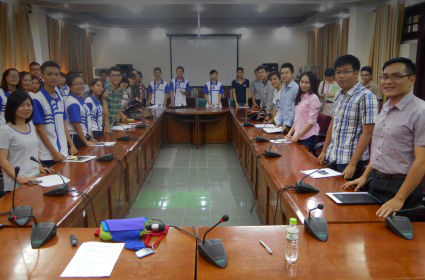Launch of the inaugural King's at VNU-Law Seminar Series
Discrimination against LGBTI Persons: Protection in International & Comparative Human Rights Law

The King’s a VNU-Law Lecture Series launched in Hanoi on 29 October 2015.
Professor Robert Wintemute spoke to an audience of 30 law students during his lecture titled: Discrimination against LGBTI Persons: Protection in International & Comparative Human Rights Law. The lecture series is the second phase of the King’s at VNU-Law Knowledge Exchange Partnership led by Professor Maleiha Malik.
King’s at VNU-Law incorporates Professor Malik’s project on Discrimination Law in Vietnam and the ASEAN region. Professor Malik has developed a legal and policy benchmark for describing and evaluating discrimination law regimes titled '10 Questions of Discrimination Law' that has been translated into Vietnamese. Professor Malik's '10 Questions of Discrimination Law' has been adopted as the basis for law reform work in a number of European countries and it is now being used in Vietnam as a benchmark for law reform and to and strengthen the work of civil society organisations striving to gain equal treatment for women, minorities, LGBT and disabled persons.
Professor Malik said:
‘I am delighted to spend time in Vietnam working with my academic colleagues, teaching students and meeting policy makers so that I can deepen my knowledge of Vietnam’s legal system, culture and society. This allows me to undertake my comparative research and policy impact on discrimination law in Vietnam and the ASEAN at a time during which this region is going through an exciting period of economic, political and social change. The close collaborations forged by King’s at VNU-Law will support the increasing focus on Vietnam at King’s Transnational Law Institute, King’s Global Institutes and the London Asia Pacific Centre for Social Sciences. King’s at VNU-Law will also encourage co-operation between Vietnamese and UK Universities that promotes long-term economic development and the welfare of people in both countries.’